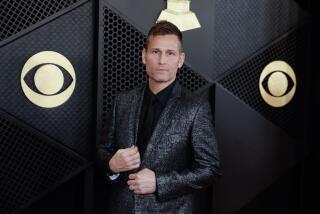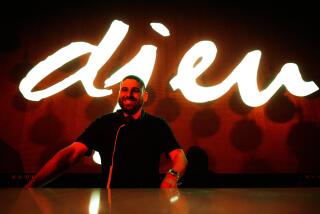Turning the tables, superstar DJs are spinning to the top
Standing onstage at San Diego’s Valley View Casino Center on Sunday night, the DJ Tiesto twisted some knobs on his Pioneer CDJ-1000 turntable as 6,500 screaming fans formed a sea of waving hands, flashing cellphone cameras and wide-eyed faces. Jets of smoke burst from cannons below the stage, igniting the crowd into a dancing frenzy.
Among the most popular DJs in the world, the Dutch superstar is one of a handful of DJs who pulls down a rock-star-sized salary jetting across the globe to cash in on electronic dance music’s rocket ride from underground movement to red-hot mainstream commodity. Tiesto spends more than 200 days a year on tour, flying from London to Bangkok to Los Angeles -- typically somewhere new every day.
The U.K.-based dance music magazine Mixmag in February voted him the greatest DJ of all time. His Kaleidoscope World Tour last year, with 175 dates on six continents, raked in more than $28 million, ranking it among the top 25 highest-grossing tours of 2010, according to Billboard magazine.
Saturday night, Tiesto, whose real name is Tijs Michiel Verwest, concludes his Club Life College Invasion tour at Carson’s 26,000-seat Home Depot Center -- a concert billed as the largest DJ event in U.S. history.
The migration of electronic dance music’s popularity from Europe to the U.S. in the last three years has fueled the trend in superstar DJs. Today, DJs such as Tiesto, David Guetta, Deadmau5 and Armin Van Buuren play stages and stadiums as big as any occupied by Lady Gaga, Arcade Fire or Britney Spears.
Just last week, in a milestone for the rise of electronic music, Swedish House Mafia sold out Madison Square Garden in nine minutes, and that was just a presale geared mostly to its Facebook fans. It will be the first dance music act to headline the historic venue when it takes the stage in December.
“Dance music has hit the spot in America and that’s amazing news,” says Steve Angello, one of three DJs in Swedish House Mafia. “It came out to the masses maybe three years ago. Pop artists and R&B; artists started to look into dance music. A lot of people say it’s gone commercial now, but the fact is that it’s good for the scene.”
Though the salaries of these globe-trotting DJs are tightly guarded secrets, they are estimated in the tens of millions of dollars a year. Tiesto, for one, owns his own jet, and houses in Sweden and Ibiza, although at the moment he calls Los Angeles’ Chateau Marmont home.
The average price of a ticket to a Tiesto show is $58.10, compared with $50.21 for Bob Dylan and $37.04 to see Snoop Dogg, according to Pollstar, a trade publication for the concert industry.
“It’s an insane life,” Tiesto says with a thick accent. “How did this happen? I was a small DJ playing to 100 people at a club in Holland. Ten years later, I’m playing in stadiums and arenas.”
Over the last several years the global electronic music touring market has grown into a billion-dollar industry, based on the sale of tickets to clubs, concerts and private events for both rock star DJs and smaller “bedroom DJs,” according to Joel Zimmerman, head of the electronic music division at William Morris Endeavor agency.
The explosive growth is directly related to the rise of social media and the Internet, according to dance music lovers and the DJs themselves. These digital tools have taken the tastemaking power away from major labels and mass media and placed it squarely in the hands -- and laptops and phones -- of music fans. Their power was on display this July, when DJ Kaskade tweeted to his 40,000 U.S. followers that he would play a free set on Hollywood Boulevard before the premiere of a rave film. The concert was canceled when thousands of fans swarmed the street, inciting a near riot and a police response. The following month Kaskade’s new album, “Dynasty,” opened at No. 5 on iTunes Album Chart, which includes all categories of music.
At the same time, personal computers have democratized the process for creating electronic music. Ten years ago, you needed a big budget and a major studio to make chart-topping hits. Today you need a basic computer and a $200 download of FL Studio, a popular digital audio workstation.
Coldplay, Rihanna and Usher are on a growing list of big-name musicians who have collaborated with DJs on songs and remixes recently.
Dance music has long enjoyed widespread adulation in Europe. The Spanish island of Ibiza is considered the dance music capital of the world since the genre experienced its first burst of popularity in the late 1980s. But it was only a few years ago that North and South America became huge emerging markets. On his current tour Tiesto played for 35,000 fans in Mexico City and says Mexico is probably the hottest place in the world for dance music right now.
At the core of the movement are the young fans, particularly between the ages of 16 and 21, who have grown up on dance music thanks to the doors opened and barriers broken by DJ-producers like Tiesto, who at 42, has been DJing for more than half his life.
“Nobody can compete with Tiesto. He’s done more things in the DJ world than anybody else,” says Swedish House Mafia’s Angello, 28. “He was the first DJ to do the arena shows, I mean he played the opening ceremony of the Olympics.”
That was in the summer of 2004 in Athens; Tiesto is in talks to DJ the 2014 World Cup in Brazil.
“That would be huge, even bigger than the Olympics,” says Tiesto, sitting with his road manager Kelly Cobb and a few friends over a lunch of sushi and sashimi at Ra in San Diego before Sunday’s show, which started at 11 p.m. and lasted more than two frenetic hours.
Tall and handsome, with tanned skin, short-cropped brownish-blond hair and a broad smile, Tiesto is wearing teal track pants, a white T-shirt, flip-flops and a Texas Longhorns cap. The hat is a testament to his recent obsession with football. He is in a fantasy football league, although he doesn’t have much time to manage his team and it loses most of the time.
That doesn’t bother Tiesto, who at the moment is focused on the Sunday show. After lunch, he goes back to his room at the Hard Rock Hotel, takes a power nap and works on music for an hour or two. That’s usually his routine on the road.
If he ever gets a long enough break from his relentless touring schedule, Tiesto says he would like a buy a proper home in a single city and outfit it with his 18,000 records, laptop and DJ booth.
“I’m going to make one room that’s just the Tiesto room,” he says, laughing. “That’s my dream to have my own club in my own house.”
--
More to Read
The biggest entertainment stories
Get our big stories about Hollywood, film, television, music, arts, culture and more right in your inbox as soon as they publish.
You may occasionally receive promotional content from the Los Angeles Times.











